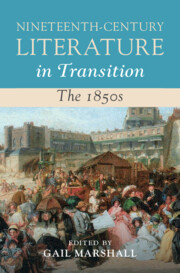Book contents
- Nineteenth-Century Literature in Transition: The 1850s
- Nineteenth-Century Literature in Transition
- Nineteenth-Century Literature in Transition: The 1850s
- Copyright page
- Contents
- Figures
- Contributors
- Acknowledgements
- Introduction
- Chapter 1 Pictures of Nature
- Chapter 2 ‘When I Came Back, It Was … to the Love of a New Generation’
- Chapter 3 George Eliot, the Westminster Circle, and Karl Ernst von Baer’s Embryological Germ Theory
- Chapter 4 The 1850s Sustainability Novel
- Chapter 5 Serialising London in ‘Twice Round the Clock’
- Chapter 6 Theatre in the 1850s
- Chapter 7 Beyond the Art of Conversation
- Chapter 8 Making Soldiers Count
- Chapter 9 Finding the Lost
- Chapter 10 British India in the 1850s
- Chapter 11 Christian Heroism
- Chapter 12 Horsepower in the Railway Age
- Chapter 13 Trauma, Gender, and Resistance
- Chapter 14 The Poetry of Married Life
- Chapter 15 George Eliot, Henry James, Realism, and Europe
- Index
Chapter 9 - Finding the Lost
The Royal Geographical Society and Discourses of Obligatory African Travel
Published online by Cambridge University Press: 02 January 2025
- Nineteenth-Century Literature in Transition: The 1850s
- Nineteenth-Century Literature in Transition
- Nineteenth-Century Literature in Transition: The 1850s
- Copyright page
- Contents
- Figures
- Contributors
- Acknowledgements
- Introduction
- Chapter 1 Pictures of Nature
- Chapter 2 ‘When I Came Back, It Was … to the Love of a New Generation’
- Chapter 3 George Eliot, the Westminster Circle, and Karl Ernst von Baer’s Embryological Germ Theory
- Chapter 4 The 1850s Sustainability Novel
- Chapter 5 Serialising London in ‘Twice Round the Clock’
- Chapter 6 Theatre in the 1850s
- Chapter 7 Beyond the Art of Conversation
- Chapter 8 Making Soldiers Count
- Chapter 9 Finding the Lost
- Chapter 10 British India in the 1850s
- Chapter 11 Christian Heroism
- Chapter 12 Horsepower in the Railway Age
- Chapter 13 Trauma, Gender, and Resistance
- Chapter 14 The Poetry of Married Life
- Chapter 15 George Eliot, Henry James, Realism, and Europe
- Index
Summary
Jessica Howell turns to an emblematic masculine figure: the explorer. Howell shows how Royal Geographical Society publications contribute to the imaginative construction of Africa within 1850s travel literature, and rhetorically create the need for further expeditions and exploration. These expeditions work hand-in-hand with the interests of the Empire, in extending and mapping its boundaries. Further, Howell highlights how the travel writing of Empire selectively appropriates local knowledge forms and occludes the suffering of the indigenous peoples who were co-opted to assist British explorers. This chapter demonstrates how one may read the archives of the Royal Geographical Society for both the discursive and physical forms of violence enacted upon local guides and servants. Howell draws upon the work of historians of gender and race to illuminate the ‘archival fragments’ (Fuentes) within the RGS materials, thereby reasserting the central role of African physical and intellectual labour to travel writing as a genre.
- Type
- Chapter
- Information
- Nineteenth-Century Literature in Transition: The 1850s , pp. 201 - 224Publisher: Cambridge University PressPrint publication year: 2025

